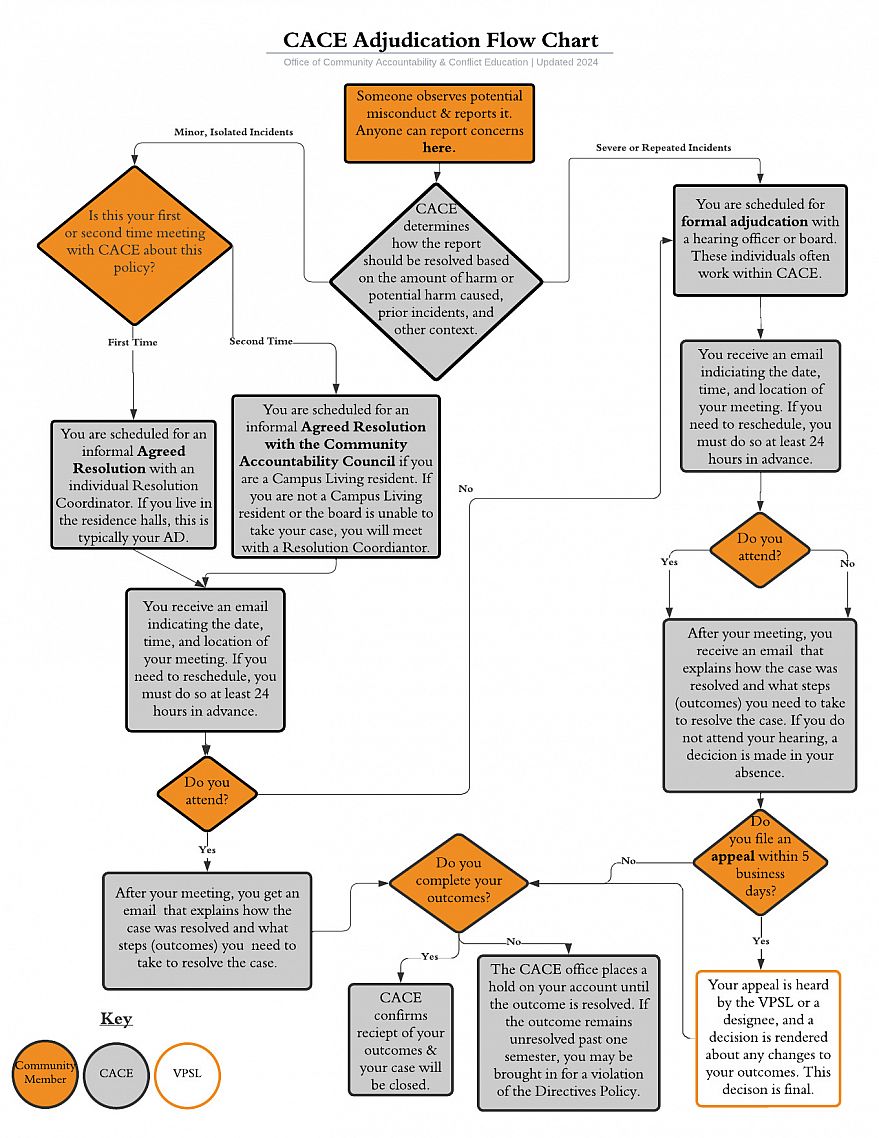Student Conduct Pathways
When a report about a potential policy violation is received by the Office of Community Accountability & Conflict Education, our staff members work to determine how each allegation of student misconduct will be resolved.
In reviewing the report of misconduct, our office weighs the severity of the incident, the impact on the community, and a student’s past conduct history to determine the appropriate path for resolution. Cases may be resolved through an informal resolution or a formal adjudication process.
Informal Resolution (“Agreed Resolution”): In cases where the alleged policy violation is not severe or has caused minimal harm, CACE may pursue an informal resolution. Our office will contact involved students to schedule a time for them to meet with a Resolution Coordinator (RC). In this meeting, they will discuss what happened in the situation, what issues and policies were involved, what harm may have been caused, and how the students could remedy that harm. The goal is for the RC and student to collaboratively develop and agree upon an appropriate resolution in the process we call an “Agreed Resolution”. If the case is not resolved through this meeting or if a student declines to participate, the case will be rerouted to the formal adjudication process.
Formal Adjudication: There are a number of formal pathways that CACE may use in order to resolve conduct cases. All of these pathways include a formal investigation and private hearing with a hearing officer or board of hearing officers. In this hearing, students have the ability to review and address evidence gathered and to share their perspective on what occurred. The final determination is made by the presiding administrator or board. The following are all of our formal hearing processes:
-
Administrative Hearing
-
Administrative Hearings are formal hearings that occur with a single Administrative Hearing Officer designated by the Assistant Dean of Students. These hearings are the most commonly scheduled for the formal adjudication pathway.
-
-
College Review Board Hearing
-
The College Review Board (CRB) is a board consisting of three College staff members. This board holds an investigation and private hearing to resolve severe cases of potential policy violations.
-
-
College Honor Board Hearing
-
The College Honor Board (CHB) is an adjudication board that exists outside of CACE. This group is convened as formal adjudication for academic issues, especially academic dishonesty. The Honor Board is chaired by a student, and advised by Professor Gordon Kelly, Head of Academic Integrity.
-
Wondering how case routing works? Check out our flow chart below:

Community Accountability and Conflict Education is located in Odell Annex on the Undergraduate Campus.
MSC: 113
email cace@lclark.edu
voice 503-768-8181
Assistant Dean of Campus Life and Student Rights and Responsibilities
Jessica Caron, MEd
Community Accountability and Conflict Education
Lewis & Clark
615 S. Palatine Hill Road
Portland OR 97219
